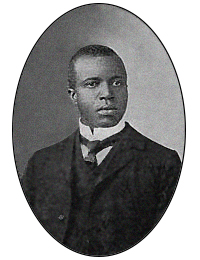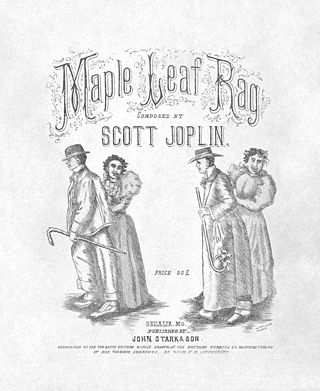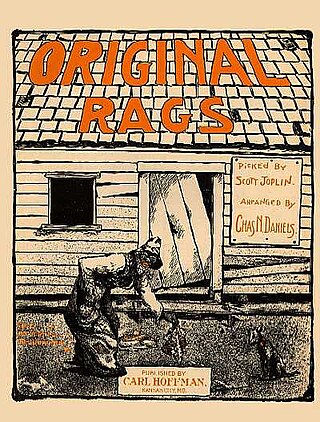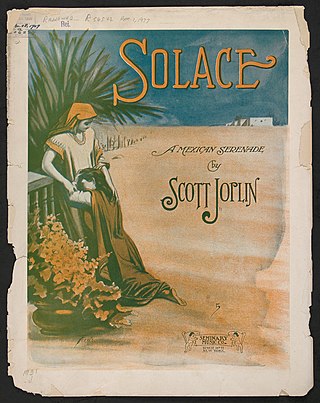
Ragtime, also spelled rag-time or rag time, is a musical style that had its peak from the 1890s to 1910s. Its cardinal trait is its syncopated or "ragged" rhythm. Ragtime was popularized during the early 20th century by composers such as Scott Joplin, James Scott and Joseph Lamb. Ragtime pieces are typically composed for and performed on piano, though the genre has been adapted for a variety of instruments and styles.

Scott Joplin was an American composer and pianist. Dubbed the "King of Ragtime", he composed more than 40 ragtime pieces, one ragtime ballet, and two operas. One of his first and most popular pieces, the "Maple Leaf Rag", became the genre's first and most influential hit, later being recognized as the quintessential rag. Joplin considered ragtime to be a form of classical music meant to be played in concert halls and largely disdained the performance of ragtime as honky tonk music most common in saloons.

Joseph Francis Lamb was an American composer of ragtime music. Lamb, of Irish descent, was the only non-African American of the "Big Three" composers of classical ragtime, the other two being Scott Joplin and James Scott. The ragtime of Joseph Lamb ranges from standard popular fare to complex and highly engaging. His use of long phrases was influenced by classical works he had learned from his sister and others while growing up, but his sense of structure was potentially derived from his study of Joplin's piano rags. By the time he added some polish to his later works in the 1950s, Lamb had mastered the classic rag genre in a way that almost no other composer was able to approach at that time, and continued to play it passably as well, as evidenced by at least two separate recordings done in his home, as well as a few recorded interviews.

James Sylvester Scott was an American ragtime composer and pianist. He is regarded as one of the "Big Three" composers of classical ragtime along with Scott Joplin and Joseph Lamb.

The "Maple Leaf Rag" is an early ragtime musical composition for piano composed by Scott Joplin. It was one of Joplin's early works, becoming the model for ragtime compositions by subsequent composers. It is one of the most famous of all ragtime pieces. Its success led to Joplin being dubbed the "King of Ragtime" by his contemporaries. The piece gave Joplin a steady if unspectacular income for the rest of his life.

"The Entertainer" is a 1902 classic piano rag written by Scott Joplin.

The "Swipesy Cakewalk" is a ragtime composition published in 1900 by a musical duo consisting of Scott Joplin, who likely composed the trio, and the young composer Arthur Marshall, who most probably composed the rest of the piece with oversight from Joplin. "Swipesy" uses the simple syncopations of a cakewalk - the first beat being a sixteenth, eighth, sixteenth note division, and the second beat an even eighth note division. The style follows the AA BB A CC DD musical form common for both cakewalks and rags, particularly after the earlier publication of Joplin's hit "Maple Leaf Rag". Although called a cakewalk, it departs from the cakewalk form in favor of the more standard ragtime idiom at various points, most notably throughout the C (Trio) section. "Swipesy" was most likely written in the late 1890s when Joplin was living with the Marshall family and teaching Arthur composition.

"Magnetic Rag" is a 1914 ragtime piano composition by American composer Scott Joplin. It is significant for being the last rag which Joplin published in his lifetime, three years before his death in 1917. It is also unique in form and in some of the musical techniques employed in the composition.

"Original Rags" was an early ragtime medley for piano. It was the first of Scott Joplin's rags to appear in print, in early 1899, preceding his "Maple Leaf Rag" by half a year.

"Frog Legs Rag" is a classic rag composed by James Scott and published by John Stillwell Stark in December 1906. It was James Scott's first commercial success. Prior to this composition Scott had published marches. With "Frog Legs Rag", Scott embarked upon a career as a successful and important ragtime songwriter.

"Weeping Willow" is a 1903 classic piano ragtime composition by Scott Joplin. It was one of Joplin's simpler and less famous ragtime scores, written during a transitional period in his life, and one of the few pieces that Joplin cut as a piano roll in a 1916 session.

"Bethena, A Concert Waltz" is a composition by Scott Joplin. It was the first Joplin work since his wife Freddie's death on September 10, 1904, of pneumonia, ten weeks after their wedding. At the time the composer had significant financial problems; the work did not sell successfully at the time of publication and was soon neglected and forgotten. It was rediscovered as a result of the Joplin revival in the 1970s and has received acclaim from Joplin's biographers and other critics. The piece combines two different styles of music, the classical waltz and the rag, and has been seen as demonstrating Joplin's excellence as a classical composer. The work has been described as "an enchantingly beautiful piece that is among the greatest of Ragtime Waltzes", a "masterpiece", and "Joplin's finest waltz".

"The Easy Winners" is a ragtime composition by Scott Joplin. One of his most popular works, it was one of the four that had been recorded as of 1940.

"Sunflower Slow Drag" is a ragtime composition by Scott Joplin and Scott Hayden. It is about four minutes long and has been described as "full of gaiety and sunshine".

"The Ragtime Dance" is a piece of ragtime music by Scott Joplin, first published in 1902.
"The Silver Swan" by Scott Joplin is a ragtime composition for piano. It is the only known Joplin composition to be originally released on piano roll instead of in musical notation.

Piano Rags by Scott Joplin is an album by Joshua Rifkin consisting of ragtime compositions by Scott Joplin, released by Nonesuch Records in 1970. The spine of the original album and various compact disc reissues render the title as Scott Joplin: Piano Rags.

"Solace" is a 1909 habanera written by Scott Joplin.

"Wall Street Rag" is a ragtime composition by Scott Joplin, first published in 1909. As indicated by the title, the theme is based on Wall Street following the events surrounding the Panic of 1907. This is represented in the musical structure along with its corresponding annotations.



















